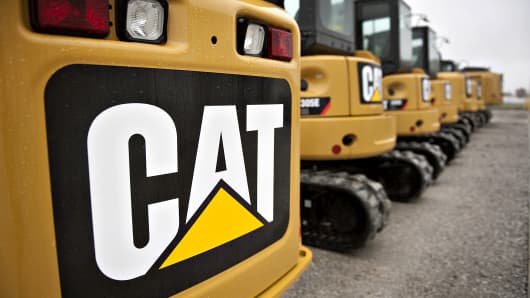Two years ago in the US, over a dinner of filet mignon and sweet potato gratin, Caterpillar chief executive Doug Oberhelman looked on as China's President Hu Jintao praised the "mutually beneficial economic co-operation" between the US and China.
With a violin serenade and a hearty welcome from Chicago mayor Richard Daley, the dinner feted Mr Hu and highlighted the industrial ties between the world's two largest economies. Caterpillar, one of the first US companies to set up shop in China after it reopened to western businesses in the late 1970s, was a co-sponsor.
(Read More: Caterpillar Earnings Hit by China Fraud, Cautious for 2013)
At the time the US machinery company's prospects in China could not have looked better. Sales of crawler excavators, a key segment, had surged 70 per cent from the previous year as the Chinese machinery market boomed. "We're going to play offense [in China], and we are going to win," Mr Oberhelman told investors.
More recently, however, Caterpillar has come badly unstuck. It has been bleeding market share as homegrown companies – many deploying suspiciously similar technology – have grabbed sales. Caterpillar's chief Chinese rival, Sany Heavy, surpassed it in market share for excavators for the first time in 2011. Last year, a drop-off in construction pushed all-important excavator sales down more than 30 percent from the previous year, according to Barclays data.
As if that were not bad enough, Caterpillar has been forced to make a costly and embarrassing goodwill impairment charge of $580 million after uncovering alleged accounting misconduct at a Chinese mining equipment company it acquired six months before.
(Read More: Caterpillar Writes Off Most of China Deal After Fraud)
It is an abrupt reversal of fortune for a company that once seemed like a textbook case of how to do things right in China. The US machinery company saw the country's potential so early that, in 1978, it opened its first Beijing office in the same year that Washington and Beijing established diplomatic ties after decades of estrangement.
In the 1980s, Caterpillar curried favor by cautiously sharing technology and know how with a dozen Chinese state-owned enterprises. As China began to urbanize in the 1990s, it was one of the first to set up a factory through a joint venture with an ambitious local group in Xuzhou. Instead of operating through dealerships, Caterpillar sold its equipment directly to its customers, even sending western executives out to remote mine sites to sign major contracts – a popular approach, according to a former customer.
However, in spite of decades of careful investment, China still accounts for only 3 per cent of Caterpillar's worldwide sales. Sales in Asia Pacific even dropped two percent in the final quarter of last year, dragged down by poor sales in China.
The US machinery company has misjudged China's capricious market for heavy machinery time and time again. In 2010, when the Chinese market was booming, Caterpillar was constrained by production capacity. Last year, as unsold machines started filling up Caterpillar's lots, the company exported more than 2,300 excavators out of China to help draw down stocks.


